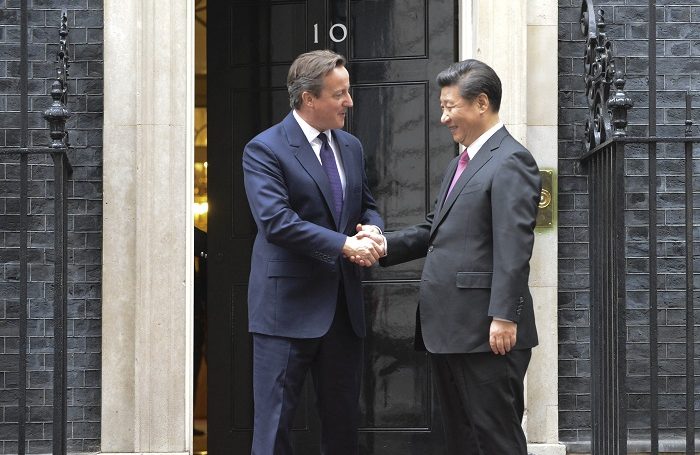
At the time it happened in mid-October last year, the State visit by President Xi Jinping to the UK struck many observers as being risky. The UK’s approach to China seemed to have changed almost 180 degrees in the space of only a few years. In 2012, after British Prime Minister David Cameron met the Dalai Lama while visiting London, relations went into deep freeze. Ministerial contact almost ceased. There were no high level bilateral visits to speak of, even during the London Olympics that year.
In 2015, however, the UK took the lead amongst Europeans in joining the Chinese instigated Asian Infrastructure Investment Bank (AIIB), and then followed this up in September with a visit to China by its chief finance leader, the Chancellor of the Exchequer George Osborne that went out of its way to stress that the relationship was overwhelmingly focused on trade and investment outcomes and in delivery of practical results. Osborne visited the Shanghai Stock Exchange, which had recently undergone significant turmoil, in order to show confidence and solidarity, and then, even more daringly, made a brief visit to the Xinjiang Autonomous Region, the first British figure at this level ever to do this.
This approach, while it has gone down well in Beijing, has puzzled Britain’s chief security allies, chief amongst them the US, and the other European Union member states. For them, it seemed to show signs of constant appeasement to Chinese demands and a wholesale capitulation to China through desire to seek economic rewards. It is true that the UK-China relationship had become moribund, a little sterile and was badly in need of some imagination and energy. On the whole British politicians in the last two decades since the hand back of Hong Kong had regarded China issues as a lower priority than those involving Europe, the Middle East, Russia or the US. There had been periods of volatility, and then uneasy harmony, but it was a relationship devoid of much passion or commitment.
Xi’s visit to the UK had a strong narrative – UK seeking real benefits from deeper involvement in Chinese outwards investment, the internationalization of the RMB through London as a finance centre, and better quality access to emerging opportunities in the Chinese domestic market. A reported USD 40 billion plus of deals was signed while Xi was in London, one of the deals controversially involving Chinese state company investment in a nuclear reactor being planned in Southern Britain.
The deterioration of the Chinese economy in the period since Xi was in Britain might suggest that the UK has somewhat missed the boat and that it should have tried this engagement strategy years earlier during the boom period in China. Even so, it might be that now China is domestically beset by a series of woes, its need for outside partnerships of the sort the UK offers is even more intense.
Perhaps the one enduring outcome from the Xi visit to the UK will be the strategic role that London’s finance centre plays in the internationalization of the Chinese currency. In many ways, this is a process well underway. RMB currency trading in London has risen exponentially in the last few years. London is large enough, global enough, and important enough for Chinese to see its value in their plans to roll out their currency. Having the top political leaders from both countries give their imprimatur to this, symbolically at least, was important.
In the other areas, though, it will be some time before we know if the UK’s 2015 gamble on China was right. If it does create a new template of engagement and influence through investment and services links then those who were critics will be silenced, or converted, to the UK model of dealing with China. But if it fails to deliver tangible things within a year or so, then it will only reinforce the idea that with China, Europe and the US and other developed economies have to continue to be very cautious.
Further Reading on E-International Relations
- China’s Economic Multilateral Diplomacy
- Opinion – The Civilisation Narrative: China’s Grand Strategy to Rule the World
- China: When the Dragon Wakes
- Opinion – Ongoing Misunderstandings in China-UK Relations
- New Perspectives on China’s Relations with the World
- The Influence of China in Bringing Peace to Myanmar